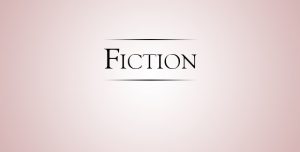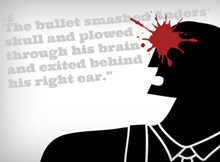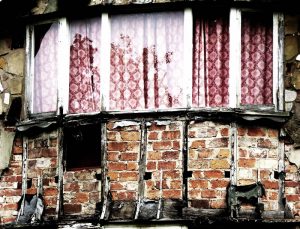
ONE ROW AHEAD
by Crissy Van Meter
I see you at Moody’s funeral. I try not to lunge at you or throw my floppy arms around your neck and ask you if you remember me, or ask you if ten years ago was even a place you want to remember. With all of this sad funeral shit, I’d assume it’s not really the time.
You’re stuck in the corner of my eye, one row back and to my right. Mom nudges me when she recognizes you.
I don’t ask anyone else about you. I don’t acknowledge you. You have your babies and your wife and we are mourning. I see your parents nearby.
The first time we kissed was in Moody’s bed. I had braces and you smelled like patchouli oil, a scent I absolutely despise now in adulthood. And cumin. I hate those smells so much because they remind me of your messy car.
Moody’s body is locked inside a glossy casket, up front by the God people, by his family, and surrounded by heaps of white and yellow flowers. Mom keeps sneezing. His parents keep playing all this Elvis gospel, his favorite, like they are begging us to cry. I think I can do it now; I think I feel something happening in my eyes.
I want to turn around, to see if you’d bother with something like crying. I want to ask you how this could have happened; how an accident can just happen; like anything just happens and suddenly everything is different, and fuck, it’s annoying.
I’m looking at the photo collages on poster boards that line the church walls, some propped up against old art easels. The photos from before we had camera phones and digital point-and-shoots. I can see us, all of us, and it’s practically like this funeral is an excuse to die from nostalgia. Might as well. Isn’t that how it works anyway? I say this in my head, to you, like you can hear me from one row ahead.
I hear your mom sniffle and I think of you consoling her by putting your hand on her hand, or maybe her shoulder. I want to turn around to remind you that my mom caught us having sex in your car, in the driveway. I want to laugh. I want to tell you.
Moody’s father speaks and the church hushes still. There are a few long sighs; those trying to catch their breath over tragedy. He speaks eloquently on the matter of this tragic accident, saying that the world is not ours and that he’s with Jesus now, with his grandmother, and then a list of others they knew who have already died.
Do you think it’s true? I want to say to you, from one row ahead.
I think you still don’t believe. I hope you don’t, so I don’t feel so fucking alone in this place. We grew up in this church; how terrible. We won goldfish here at the carnival in eighth grade; you won one for me that died about three days later. You left yours in a bowl on top of the microwave and it exploded.
The soundtrack to this funeral is killing me. I really think I could just die. This pain of watching it unfold, knowing you’re behind me, and that none of this exists anymore is too much over the deep blues of Elvis Presley telling me I did it all wrong. I can’t even think of Moody at a time like this.
I’m wearing blue jeans. Mom is actually in jean shorts. It’s inappropriate. The airline lost our bags, or really misplaced them. How do you lose something? Where does it even go? I’m ready to turn around now—someone’s mid-speech at the podium—and ask you that. I want to tell you that my clothes are my plane clothes and that it was one hundred degrees in New York when I boarded. That’s why I’m wearing this stained loose-fitting tank top.
I feel terrible. I had sex with Moody too, and I saw a few others on the way in. Even one of his cousins, a pallbearer. It seems so hard to be practical now. All the girls from high school leaning against the walls, a few pregnant. They wanted Moody too; maybe a few got him. He’d never tell me that stuff.
I look like an asshole in these clothes. Like in a matter of ten years, I got chubby and became white trash in its purest form.
I want to get up there to talk about Moody. The older I get, the more of these I go to, the better I get at articulating my memories. But not in these jeans, I say to Mom when she nudges me again to get on the microphone.
You must be fucking insane, I whisper.
You could have heard a tiny echo of my voice if you were paying attention. But you’re probably grieving properly back there, really thinking about Moody, and I’m thinking about you.
Moody’s brothers talk about all the years they spent up at Big Sur, and they talk about camping. I listen closely; I went on most of those trips.
You were invited once. I know you have to be thinking of it now. We planned it for a month and we were going to share a tent. When we picked you up, you were sitting in a chair in your backyard. There were no provisions packed, and Rachel Martin was in her white bikini, running and jumping off the diving board into your parent’s perfectly maintained pool. You acted surprised. We went without you and I cried for the first hour on the drive north. Moody put his hand on my knee and I finally fell asleep in his lap in the backseat. Me and Moody shared a sleeping bag that whole trip.
After a slideshow and a long-talking priest, we stand and we are to exit. I need a closer look though, at least at the casket they chose, at least at Moody himself, like I’m going to take a quick peek inside. Maybe they’ll let me lift the lid for a second.
I ease up to the front while Mom escapes, totally mortified at her bare and blonde hairy legs showing. She says she’ll meet me in the car. It’s getting quiet in here, and I make it to the altar. I see our old friends and Moody’s brother, who I kissed once at a roller rink. He hugs me and it feels really good to be touched. He leads me to Moody’s shiny closed box.
It doesn’t matter to me, the casket I mean. It’s not Moody. Instead I start to search for my face in photos. There are stacks of them and so many pinned to cork boards. It’s like I never know how much anything means, in the present at least. To go through these glossy photographs, some stuck together, to remember Moody seems impossible. To remember any of it.
I feel you lurking. I think of how I will explain my attire, or what I will say about my life. On the drive over, I decided rightfully that I would not say I’m unemployed, single, and that my record deal fell through. I will not say that I am down to about one gig a month and it’s in Queens.
You’re now standing next to me, examining the photos too. We’re wrapped around each other in most of these shots. I wish I had more time to peruse; I was really looking for pictures of us. I’m not even focused on photos of Moody. I want to find the photos of us, the ones that Moody took in his backyard, when we’d lay in his tree house all day. Where are those photos?
“What a mess,” you say.
I nod.
I’m angry. Do you mean we are a mess, you are a mess, or Moody was a mess?
“I hadn’t seen him in a few years,” you say.
I had. Moody was just in New York. He stayed for a weekend; we made out, too. He told me he loved me and I should’ve just said it back.
“Well, you are so busy now,” I say.
I can tell we want to embrace. I don’t think I’m imagining that. We are edging so close, but I don’t reach and neither do you.
“How’re the boys?” I ask.
You tell me that they are crawling and that two is really much harder than one. I want to blurt out obscene things. Like how I see their photos on Facebook and Instagram and it’s like I still know you.
We’re next to the casket now.
“You still in New York?” you ask.
I tell him I’m unemployed, that my record label dropped me, that I only play in Queens, deep in Queens. I even tell him that the airline lost my bags and that I’m wearing sloppy clothes by pure accident. I say it all so quickly.
“Moody wouldn’t care,” you say.
Probably true. We even laugh for a second.
“God, he loved you so much,” you say.
Now I feel so bad. Even after he’s dead, I don’t love him as much as I do you.
“Not really,” I say.
I can feel my cell phone buzzing in my back pocket, against my probably bigger-than-high school ass. I don’t dare grab it. I stare intently at you.
We don’t have much to say and thankfully some old friends approach. Even Rachel is here. Now we are all hugging and I’m still in jeans. We are talking about our lives; some are rich and some are fat. Most are both. Rachel still looks good. I bet she’d still fit into that stupid bikini.
I see you talking to her.
I want to get Real Housewives crazy on you, flip over Moody’s coffin and scream. Instead I pretend I’m in a hurry and shuffle to an exit.
You grab my arm, almost forcefully. You make weird eyes at me, like you don’t want to talk to crazy Rachel. So I stay for a second, overwhelmed by your grip. I overhear her saying she’s a model, and we all know from Facebook that she’s got four kids and does catalog shoots for cash. She made the cover of the JC Penney insert last summer.
“You’re not going to the graveside?” you ask.
I hadn’t planned on it. It is too hard for me; he is already gone and I couldn’t watch him planted in that shitty cemetery next to Denny’s. And Mom is in the car waiting to get back to our hotel. The sun is finally coming out and she insisted we buy bathing suits at Wal-Mart on the way home. At least we can get some color.
“My Mom needs to be somewhere,” I say.
“Why don’t we go together?” he says.
I look around for your wife, your parents, those really ginger twins of yours. You tell me she took them home and that you drove yourself. But it’s enough, just the thought of being in your car, that sweet waft of cumin and smelly shoes. It’s a small win to tell you no, thanks.
*
Mom and I browse the bathing suits at Wal-Mart. I find a nifty red onesie that looks like something I wore in a photo when I was just a kid. It’s sold with a little ruffle at the top. I opt for the large, hoping it will stretch. Mom gets a blue and white tankini. We grab some candy and waters at the register and she asks about you.
*
The sun is an unfortunate bright, and when I open my eyes to scan Mom floating in the hotel pool, my vision turns blue. The longer my eyes are closed, I begin to see things in all shades of purple. I think of Moody accidentally. I think of how he would describe this, pleasurable, and I finally make my way to the side of the pool. I dunk my feet and slowly slink under the water and everything is quiet. I think of Moody and it’s just enough to be sad.
I think of calling you later that night to leave a weird voicemail. I think of reciting good times and talking about Moody. But I don’t. I sleep in my bathing suit and I know I’ll itch in the morning.
============================================================================
 Crissy Van Meter is the co-founder of Five Quarterly, an online literary project out of Brooklyn, New York. She lives in Los Angeles. www.crissyvanmeter.com
Crissy Van Meter is the co-founder of Five Quarterly, an online literary project out of Brooklyn, New York. She lives in Los Angeles. www.crissyvanmeter.com

 Katharine Johnsen studies and teaches at the University of North Carolina Wilmington, where she is the recipient of the Bernice Kert Fellowship. Her poems have appeared or are forthcoming in Mid-American Review, Painted Bride Quarterly, Birmingham Poetry Review, and elsewhere. She was recently awarded a scholarship from the Sewanee Writers’ Conference and earned her BA from Emory University.
Katharine Johnsen studies and teaches at the University of North Carolina Wilmington, where she is the recipient of the Bernice Kert Fellowship. Her poems have appeared or are forthcoming in Mid-American Review, Painted Bride Quarterly, Birmingham Poetry Review, and elsewhere. She was recently awarded a scholarship from the Sewanee Writers’ Conference and earned her BA from Emory University.









 In addition to Mixed Diction (Mammoth books, 2009), Jeff Schiff is the author of Anywhere in this Country (Mammoth Press), The Homily of Infinitude (Pennsylvania Review Press), The Rats of Patzcuaro (Poetry Link), Resources for Writing About Literature (HarperCollins), and Burro Heart (Mammoth books). His work has appeared internationally in more than eighty periodicals, including The Alembic, Grand Street, The Ohio Review, Poet & Critic, The Louisville Review, Tendril, Pembroke Magazine, Carolina Review, Chicago Review, Hawaii Review, Southern Humanities Review, River City, Indiana Review, Willow Springs, and The Southwest Review. He has been a member of the English faculty at Columbia College Chicago since 1987.
In addition to Mixed Diction (Mammoth books, 2009), Jeff Schiff is the author of Anywhere in this Country (Mammoth Press), The Homily of Infinitude (Pennsylvania Review Press), The Rats of Patzcuaro (Poetry Link), Resources for Writing About Literature (HarperCollins), and Burro Heart (Mammoth books). His work has appeared internationally in more than eighty periodicals, including The Alembic, Grand Street, The Ohio Review, Poet & Critic, The Louisville Review, Tendril, Pembroke Magazine, Carolina Review, Chicago Review, Hawaii Review, Southern Humanities Review, River City, Indiana Review, Willow Springs, and The Southwest Review. He has been a member of the English faculty at Columbia College Chicago since 1987.
